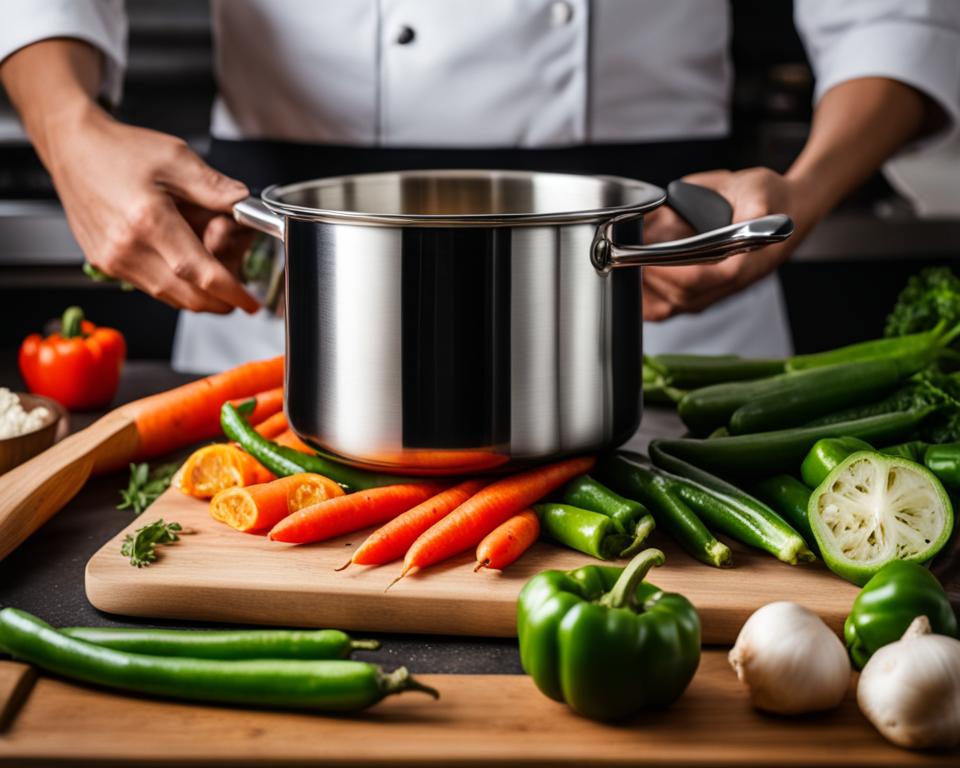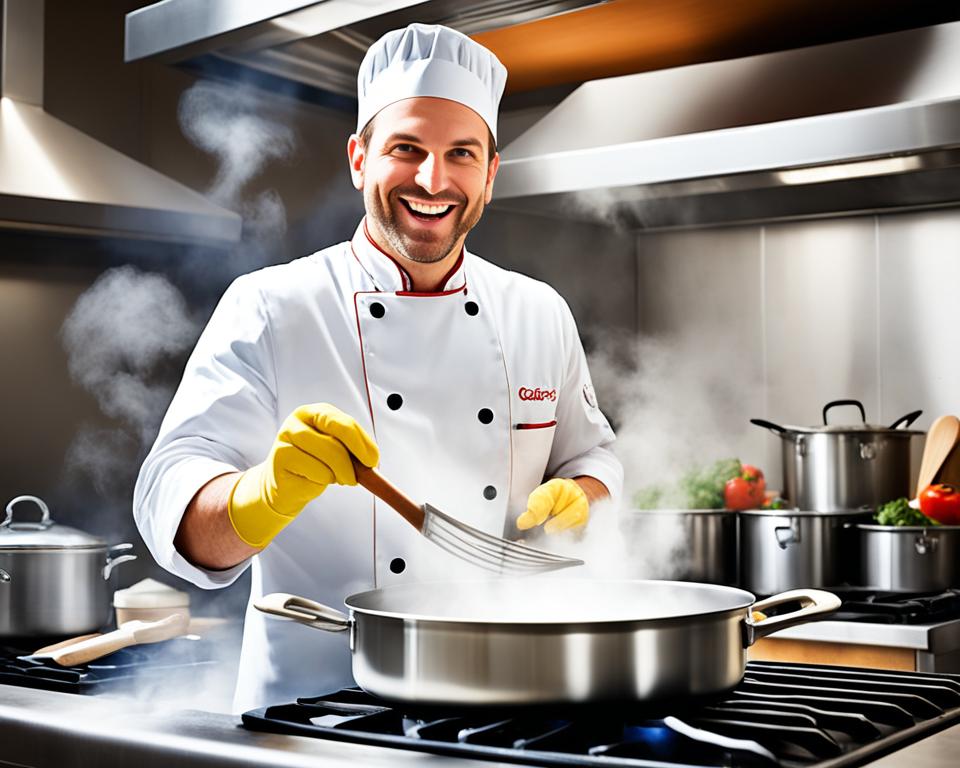Introduction
Carbon steel and stainless steel are two popular choices for cookware, each with its own set of advantages and disadvantages. In this article, we will compare carbon steel and stainless steel cookware in detail, so you can make an informed decision about which type is right for you.
We will cover the following topics:
- The different properties of carbon steel and stainless steel
- The pros and cons of each type of cookware
- Which type of cookware is best for different cooking tasks
By the end of this article, you will have a good understanding of the differences between carbon steel and stainless steel cookware, and you will be able to choose the type that is best for your needs.
Carbon Steel Cookware
Carbon steel cookware is a type of cookware made from carbon steel, a material that is composed of iron and carbon. Carbon steel cookware is known for its excellent heat conduction and retention, making it ideal for searing, frying, and other high-heat cooking methods. Carbon steel cookware is also relatively affordable and easy to care for.
However, carbon steel cookware can also be prone to rust if it is not properly maintained. Additionally, carbon steel cookware can be more difficult to clean than stainless steel cookware.
Overall, carbon steel cookware is a good option for cooks who are looking for a durable, affordable, and versatile type of cookware. However, it is important to be aware of the potential drawbacks of carbon steel cookware before making a purchase.
III. Stainless Steel Cookware
Stainless steel cookware is made from a combination of iron, chromium, and nickel. The chromium content gives stainless steel its corrosion-resistant properties, while the nickel content helps to improve its strength and durability. Stainless steel cookware is available in a variety of grades, with the most common being 18/8 stainless steel. This grade of stainless steel contains 18% chromium and 8% nickel.
Stainless steel cookware is a good choice for all types of cooking, but it is particularly well-suited for searing, frying, and other high-heat cooking methods. Stainless steel is also relatively easy to clean and maintain.
Here are some of the pros and cons of stainless steel cookware:
- Pros:
- Corrosion-resistant
- Durable
- Heats evenly
- Easy to clean
- Cons:
- Can be reactive with acidic foods
- Can be more expensive than other types of cookware
IV. Pros and Cons of Carbon Steel Cookware
Here are some of the pros and cons of carbon steel cookware:
- Pros:
- Carbon steel is a very durable material that can withstand high heat and prolonged use.
- Carbon steel cookware heats up evenly and quickly, making it ideal for searing meats and other dishes that require high heat.
- Carbon steel is a non-stick surface that can be easily cleaned with soap and water.
- Carbon steel cookware is relatively affordable compared to other types of cookware, such as stainless steel or cast iron.
- Cons:
- Carbon steel cookware can rust if it is not properly seasoned and cared for.
- Carbon steel cookware is heavier than other types of cookware, such as stainless steel or aluminum.
- Carbon steel cookware can be more difficult to maintain than other types of cookware, such as stainless steel or cast iron.
- Pros:
- Durable: Stainless steel is a very durable material that can withstand high heat and repeated use.
- Versatile: Stainless steel cookware can be used for a variety of cooking methods, including searing, frying, boiling, and steaming.
- Easy to care for: Stainless steel cookware is easy to clean and maintain.
- Cons:
- Pricey: Stainless steel cookware can be more expensive than other types of cookware, such as aluminum or nonstick.
- Can be reactive: Stainless steel is not a non-reactive material, so it can react with acidic foods, such as tomatoes or vinegar. This can cause the food to taste metallic.
- Can be heavy: Stainless steel cookware can be heavier than other types of cookware, such as aluminum.
- **Your cooking style:** If you do a lot of searing or browning, carbon steel is a good option because it heats up quickly and evenly. Stainless steel is a better choice if you do a lot of simmering or braising, as it is more resistant to sticking.
- **Your budget:** Carbon steel cookware is typically more affordable than stainless steel cookware. However, you can find high-quality stainless steel cookware at a variety of price points.
- **Your care and maintenance needs:** Carbon steel cookware requires more care and maintenance than stainless steel cookware. You will need to season it regularly and be careful not to overheat it. Stainless steel cookware is more durable and requires less maintenance.
- Heats up quickly and evenly
- Develops a natural non-stick coating with use
- Affordable
- Requires more care and maintenance
- More prone to sticking if not seasoned properly
- Durable and long-lasting
- Easy to clean
- Resists sticking
- Heats up more slowly than carbon steel
- More expensive
- Carbon Steel vs Stainless Steel Cookware: Which is Better?
- How to Season Carbon Steel Pans
- How to Choose the Right Cookware
- Wash the cookware with hot, soapy water and dry it thoroughly.
- Apply a thin layer of cooking oil to the inside and outside of the cookware.
- Place the cookware in a preheated oven at 350 degrees Fahrenheit for 30 minutes.
- Allow the cookware to cool completely before using it.
- Wash the cookware with hot, soapy water and dry it thoroughly.
- If there are any stubborn stains, you can use a mild abrasive cleaner or a vinegar and baking soda solution.
- Do not use harsh chemicals or abrasive cleaners on carbon steel cookware, as this can damage the seasoning.
- Keep the cookware dry after washing.
- Wipe the cookware with a thin layer of oil after each use.
- Store the cookware in a dry place.
V. Pros and Cons of Stainless Steel Cookware
Stainless steel cookware is a popular choice for many home cooks because it is durable, versatile, and easy to care for. Here are some of the pros and cons of stainless steel cookware:
VI. Which Cookware is Right for You?
The best cookware for you depends on your individual needs and preferences. Here are a few factors to consider when making your decision:
Ultimately, the best way to decide which type of cookware is right for you is to try both and see which one you prefer.
Here is a table summarizing the pros and cons of each type of cookware:
| Type of Cookware | Pros | Cons |
|---|---|---|
| Carbon Steel |
|
|
| Stainless Steel |
|
|
VII. Conclusion
Carbon steel and stainless steel cookware are both excellent choices for cooking. However, there are some key differences between the two materials that you should consider before making a purchase. Carbon steel is more responsive to heat and can achieve higher temperatures than stainless steel. It is also more durable and can be seasoned to create a non-stick surface. However, carbon steel is more prone to rust and requires more care and maintenance than stainless steel. Stainless steel is more corrosion-resistant and easier to clean than carbon steel. It is also more versatile and can be used for a wider variety of cooking methods. Ultimately, the best cookware for you will depend on your individual needs and preferences.
Resources
Here are some resources that you may find helpful:
Q: What is the difference between carbon steel and stainless steel cookware?
A: Carbon steel and stainless steel are two different types of cookware with different properties. Carbon steel is a more affordable option that is harder and more durable than stainless steel. However, it is also more prone to rust and requires more maintenance. Stainless steel is more expensive than carbon steel, but it is easier to clean and maintain and is less likely to rust.
Q: Which type of cookware is better for searing meat?
A: Carbon steel is better for searing meat because it has a higher heat conductivity than stainless steel. This means that it can heat up more quickly and evenly, which results in a better sear.
Q: Which type of cookware is better for making sauces?
A: Stainless steel is better for making sauces because it is less reactive than carbon steel. This means that it will not react with the acids in the sauce and will not impart any metallic flavors.
Q: Can I use carbon steel cookware on induction cooktops?
Yes, you can use carbon steel cookware on induction cooktops. However, you will need to use a magnetic stainless steel or cast iron trivet to protect the cooktop from scratches.
Q: How do I season carbon steel cookware?
To season carbon steel cookware, you will need to:
Q: How do I clean carbon steel cookware?
To clean carbon steel cookware, you will need to:
Q: How do I prevent carbon steel cookware from rusting?
To prevent carbon steel cookware from rusting, you will need to:


